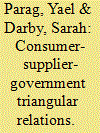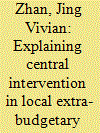|
|
|
Sort Order |
|
|
|
Items / Page
|
|
|
|
|
|
|
| Srl | Item |
| 1 |
ID:
155497


|
|
|
|
|
| Summary/Abstract |
A state that enlists foreign fighters as extensions of its own military power confronts an acute principal-agent problem. While the state (principal) might benefit by delegating security responsibilities to foreigners (agents), it risks seeing its aims partially implemented, unfulfilled, or even subverted. For more than a century, the United States has attempted to mitigate this problem as it has raised, trained, and armed proxies to fight its small wars. But we find considerable variation in its approach across time and space. Why? Rationalist treatments of the agency problem face difficulty in accounting for this variation, as they focus on goal incongruity between the principal and agent. This downplays, if not ignores, the historical and social process that leads to different manifestations of goal incongruity. Thus, I propose a constructivist reworking of agency theory. I stress how the principal draws upon, and deploys, social knowledge to identify and manage the particular hazards that it believes its agent poses. Mining primary sources, I show that changing characterizations of local proxies—as either biologically or culturally flawed—led to different interpretations of the agency problem. In turn, this led American officials to adopt different approaches to mitigating it—ranging from outright paternalism to less direct tutelage.
|
|
|
|
|
|
|
|
|
|
|
|
|
|
|
|
| 2 |
ID:
089555


|
|
|
|
|
| Publication |
2009.
|
| Summary/Abstract |
This paper applies a common-agency model to demonstrate why recent enterprise reforms that assign the State Asset Supervision and Administration Commission (SASAC) a greater role in running China's state-owned enterprises (SOEs) are apt to fail. In a theoretical framework, we show that local principals' incentive payments are likely to clash with those of SASAC as local SOE principals' promote social stability and SASAC bolsters SOE efficiency. A second-best outcome requires a social planner to restrict actions by local principals and to impose taxes/subsidies to address inter-principal externalities. In the long run, the simplest solution is to privatize SOEs and find a public-sector funding source for promoting social stability.
|
|
|
|
|
|
|
|
|
|
|
|
|
|
|
|
| 3 |
ID:
091567


|
|
|
|
|
| Publication |
2009.
|
| Summary/Abstract |
The UK residential (household) sector is responsible for approximately 30% of total carbon dioxide emissions and is often seen as the most promising in terms of early reductions. As most direct household emissions come from only two fuel sources, this paper critically examines how existing emissions reduction policies for the sector shape - and are shaped by - relations between the three main groups of actor in this policy domain: central government, gas and electricity suppliers, and energy users. Focusing on relations between three dyads (government-suppliers, suppliers-consumers and consumers-government) enables us to examine aspects of demand reduction that have often been overlooked to date. By 'relations' we refer to services, power relationships and flows of capital and information, as well as less easily defined elements such as loyalty, trust and accountability. The paper argues that the chosen government policy path to deliver demand reduction, which heavily emphasises the suppliers' role, suffers from principal-agent problems, fails to align consumers and supplier interests toward emissions reduction, and does not yet portray a lower-carbon future in positive terms. It suggests that more attention should be paid to government-consumer relations, recognising that energy consumers are also citizens.
|
|
|
|
|
|
|
|
|
|
|
|
|
|
|
|
| 4 |
ID:
188253


|
|
|
|
|
| Summary/Abstract |
This paper analyses the dynamics of violence during civilian displacement operations. Specifically, we argue that the integration of security forces – solid command structure, monitoring of troops, and the quality of personnel – influences not only the military performance but also the level of civilian costs. That is, a highly integrated army can commit soldiers to displacement operations while minimising violence. When conducted by a partially integrated army, however, displacement operations are at risk of mass killing, pushing soldiers to remove civilians without sophisticated control. Our qualitative analysis of three major counter-guerrilla operations in South Korea provides support for our thesis.
|
|
|
|
|
|
|
|
|
|
|
|
|
|
|
|
| 5 |
ID:
105223


|
|
|
|
|
| Publication |
2011.
|
| Summary/Abstract |
Chinese local governments widely resort to extra-budgetary exaction to finance themselves, which generates side effects that necessitate central intervention. Through statistical analysis, this paper finds that the central government intervenes only selectively, following a logic driven by economic development and political stability.
|
|
|
|
|
|
|
|
|
|
|
|
|
|
|
|
| 6 |
ID:
163540


|
|
|
|
|
| Summary/Abstract |
New Zealand's housing is some of the poorest quality and hardest to heat in the developed world. The private rented sector in particular offers the worst quality accommodation to the country's poorest and most vulnerable tenants. Previous research has established a range of economic and socio-cultural explanations for the prevalence of poor conditions in private rented accommodation with the 'principal-agent problem' dominating the debate. This paper reports the findings from research in Dunedin, a city with some of the coldest conditions and least energy efficient properties in the country. The study was undertaken in 2015 and involved 30 in-depth interviews with landlords exploring their attitudes towards improving the thermal performance and energy efficiency of their properties. The results revealed a shift in attitudes amongst landlords over a period of about 5 years, with many becoming more amenable to investing in insulation and low energy heat sources. This shift has ostensibly been driven by pressure from tenants who appear to be departing from established cultural norms and becoming intolerant of cold homes and high bills. The study highlights how socio-cultural factors, such as growing expectations regarding warmth and comfort in the home, can disrupt established cultural norms and economic rationales to bring about change.
|
|
|
|
|
|
|
|
|
|
|
|
|
|
|
|
|
|
|
|
|